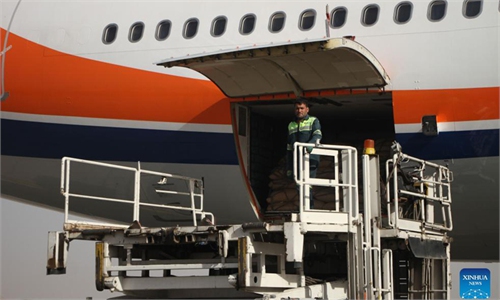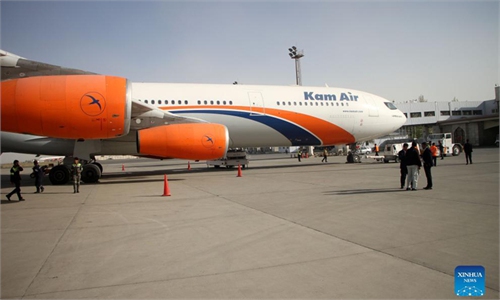COMMENTS / EXPERT ASSESSMENT
Afghan pine nuts to become glue for future economic trade

Illustration: Xia Qing/GT
The "pine nut air transport corridor" between China and Afghanistan has been recently relaunched, and is being viewed as crucial for the recovery of Afghanistan's war-torn economy. Since the first shipment of Afghan pine nuts to China, the China Arab Economic and Trade Promotion Committee in Kabul has received a constant stream of phone calls, WeChat messages and emails with requests to learn more about China-bound shipping channels.After the US withdrawal in August, Afghanistan's economic predicament gained continuing attention from the international community. Especially given that nearly $10 billion in assets belonging to the Afghan Central Bank was frozen by Western countries, the shipment of Afghan pine nuts to China became the first large-scaled international trade and economic cooperation breakthrough of the Central Asian country.
As far back as June 2018, China and Afghanistan signed an agreement on the export of Afghan pine nuts to China, and the "pine nut air transport corridor" was officially launched. Afghanistan exports over 1,000 tons of pine nuts every year. As of November, only China resumed the pine nuts trade channel with Afghanistan.
During a visit to the headquarters of Kam Air which transports pine nuts to China, we learned that Afghanistan planned to export over 2,000 tons of pine nuts to China this year. According to information given by the Afghan National Trade Office, cargo flights for pine nuts are already scheduled until next month.
A pinecone needs three years from blossom to ripen, each cone only produces a limited volume of edible nuts. The flowering phase of Afghan pine nuts may last for five weeks and is typically harvested from September to October each year after. It usually takes a month after pine nuts get ripen, picked and transported to processing factory, and can be shipped to China in November.
Pine nuts are a major crop exported from Afghanistan to China and are also an important source of income for Afghan farmers and the Afghan government. But the lack of a developed labor market and transport capacity limits potential revenue.
Provided safety standards are met, we believed that Chinese know-how and agricultural machinery can be deployed to assist Afghan farmers. In addition, we have started to explore with agricultural business at a macro level, including discussion Chinese-participated corporation projects with local agricultural departments and farmers.
According to the official data obtained from the Afghanistan Ministry of Agriculture, 72 percent of Afghanistan's population participate in either agriculture or animal husbandry representing the nation's economic lifeblood industry. But low levels of efficiency and mechanization often mean that meeting the demand of the domestic market is a challenge, let alone building an export industry for these products.
The planting of pine nuts could change the Afghan agriculture economy and end a history of opium productions. Afghanistan is shifting pine nut exports from Europe to China. The export of pine nuts to China could help Afghanistan to overcome current struggling economic condition, and may become a glue for the country's future international trade.
The author is director of China Arab Economic and Trade Promotion Committee in Kabul. bizopinion@globaltimes.com.cn



